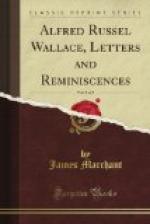Again and again Wallace drew attention to the fundamental duties of landownership, maintaining that the public, as a whole, had become so blinded by custom that no effectual social reform would ever be established unless some strenuous and unremitting effort was made to recover the land by law from those who had made the land laws and who had niched the common heritage of humanity for their own private aggrandisement.
With regard to the actual value of land, Wallace pointed out that the last valuation was made in the year 1692, and therefore, with the increase of value through minerals and other products since then, the arrears of land tax due up to 1905 would amount to more than the value of all the agricultural land of our country at the present time; therefore existing landlords, in clamouring for their alleged rights of property, might find out that those “rights” no longer exist.
Yet another point on which he insisted was the right of way through fields or woodlands, and especially beside the sea. With the advent of the motor-car and other swift means of locomotion, the public roads are no longer safe and pleasurable for pedestrians; besides the iniquitous fact that hundreds are kept from enjoying the beauties of nature by the utterly selfish and useless reservations of such by-paths by the landowner.
“This all-embracing system of land-robbery,” again he writes, “for which nothing is too great or too small; which has absorbed meadow and forest, moor and mountain, which has appropriated most of our rivers and lakes and the fish that live in them; making the agriculturist pay for his seaweed manure and the fisherman for his bait of shell-fish; which has desolated whole counties to replace men by sheep or cattle, and has destroyed fields and cottages to make a wilderness for deer and grouse; which has stolen the commons and filched the roadside wastes; which has driven the labouring poor into the cities, and thus been the chief cause of the misery, disease, and early death of thousands ... it is the advocates of this inhuman system who, when a partial restitution of their unholy gains is proposed, are the loudest in their cries of ‘robbery’!
“But all the robbery, all the spoliation, all the legal and illegal filching, has been on their side.... They made the laws to legalise their actions, and, some day, we, the people, will make laws which will not only legalise but justify our process of restitution. It will justify it, because, unlike their laws, which always took from the poor to give to the rich—to the very class which made the laws—ours will only take from the superfluity of the rich, not to give to the poor or to any individuals, but to so administer as to enable every man to live by honest work, to restore to the whole people their birthright in their native soil, and to relieve all alike from a heavy burden of unnecessary and unjust taxation. This will be the true statesmanship of the future, and it will be justified alike by equity, by ethics, and by religion.”




